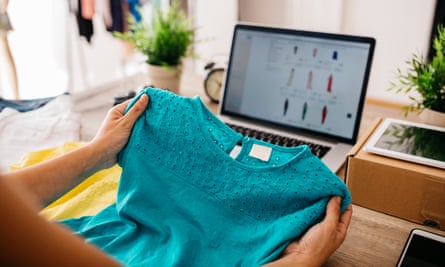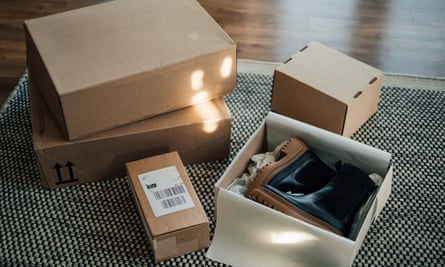When Emma was shopping online for clothes or makeup, and saw the option to pay later on the checkout page, “it sounded great”, she says. “I thought: ‘I can just pay this off when I get paid.’ But I quickly realised what I racked up was not realistic to pay off in a month, especially not when all of it is due at the same time.” Before long, she owed £900. She now has to pay £300 within the next few days, and doesn’t have it. She started using buy now, pay later on clothes, but once she was in a cycle of paying off previous months’ purchases with each payday, she was soon using it for essentials such as groceries. Emma says her limit was increased without her knowledge and therefore she was spending more than she thought she was. “I always assumed I was within my limit. I didn’t consider that the limit had actually gone up.”
Buy now, pay later (BNPL) is booming, even as financial experts are warning of growing pressure on the business model, amid consumer belt-tightening and greater regulatory scrutiny. Go to the websites of many retailers – including Marks & Spencer and online fashion companies such as Asos – and they will offer a chance to “spread the cost” through companies such as Klarna and Clearpay, or through their own longstanding schemes (such as those offered by online retailers Very and Littlewoods). The number of retailers that Klarna, a Swedish company and one of the biggest BNPL operators in the UK, works with has risen 59% to 22,000 in the past year. Apple is about to enter the BNPL market in the US, giving users of Apple Pay the chance to spread their payments over four interest-free months, PayPal also offers it, and UK banks are joining in – Barclays has a BNPL deal with Amazon, NatWest launched a BNPL scheme in June and later in the year, Virgin Money is launching a BNPL scheme.
 View image in fullscreenBetween January and June this year, 41% of borrowers had missed a BNPL payment. Photograph: Westend61/Getty Images
View image in fullscreenBetween January and June this year, 41% of borrowers had missed a BNPL payment. Photograph: Westend61/Getty Images
In the UK, more than £5.6bn was spent using BNPL between January and June, according to a study by the credit reference service Credit Karma; last year, it took until October to reach that amount. There are benefits to the deals – if you know you can afford the payments, it can make sense to spread the cost, and Credit Karma found that many people were using BNPL instead of bank overdrafts, which can charge high interest rates. However, the study also revealed 41% of borrowers had missed a payment (last year, it was 11%), which suggests people are taking on debt that they cannot afford. Last month, a study by the University of Edinburgh found that one in 10 public-sector workers, including NHS staff, turned to BNPL after failing affordability tests for conventional lending and being refused conventional loans. And earlier this year, Citizens Advice found that 42% of people who had recently paid with BNPL were using credit cards or borrowing from other sources to make the repayments.
The idea that something expensive becomes affordable if paid for in instalments “is quite a powerful message”, says Sue Anderson, head of media at the debt charity StepChange. “The problem is, for many people, the attractiveness of that perhaps outweighs any concern about whether you really will be able to afford it when you actually have to pay in the future. Particularly if people have taken out multiple BNPL products with different providers, that can stack up.”
Debt concerns as UK public sector workers turn to buy now, pay laterRead more
In January, research by StepChange found that 87% of people with a BNPL loan also had at least one other consumer credit debt, nearly half had trouble keeping up with household bills and credit repayments, and 17% met the charity’s definition of being in severe financial difficulty.
Among clients seeking help, StepChange is seeing more BNPL loans among their range of debts. The organisation is noticing “quite a correlation between use of buy now, pay later, and inability to make ends meet and pay bills”, says Anderson. “It was a product that I think most people, originally at least, associated with highly discretionary purchases – things like fashion, maybe some of the treats of life. It was very much being marketed through influencers on social media. But as the product has begun to mature, we’ve seen people using it for a lot more different purposes, and using it multiple times across different providers, for essentials.” People have been using it to pay for supermarket shopping and even utility bills, she says. “The more that happens, and the more available this is, the more we need to be concerned about the fact that that is a coping strategy that many people might turn to.”
A review commissioned by the Financial Conduct Authority (FCA) found that BNPL was particularly attractive to younger people – about 75% of customers are thought to be under 36, and the majority are female. The pandemic accelerated use, partly because of financial difficulties but also because online retailers embraced the schemes.“There are lots of psychological methods that are used to encourage people at the checkout,” says Anderson. “Let’s remember that buy now, pay later emerged as a sell-in to retailers to enable them to increase their sales.” Companies that offer BNPL products to retailers claim consumers are more likely to buy something and spend more, and less likely to abandon their online shopping basket.
 View image in fullscreen‘I’d see the buy now, pay later option and go: “That’s fine – I’ll just pay everything next month.”’ Photograph: Oscar Wong/Getty ImagesWhere will struggling households turn to after UK clampdown on payday lenders?Read more
View image in fullscreen‘I’d see the buy now, pay later option and go: “That’s fine – I’ll just pay everything next month.”’ Photograph: Oscar Wong/Getty ImagesWhere will struggling households turn to after UK clampdown on payday lenders?Read more
Emma says she did feel she was encouraged to get into debt by making purchases she couldn’t really afford. “I’d go through my basket and see if I needed everything that was buying, and then I’d see the ‘buy now, pay later’ option and go: ‘That’s fine – I’ll just pay everything next month.’ In that second, I didn’t stop to take into account the other stuff I’d already bought that was going to be due, or necessities that I’d have to pay off first. Some sites give you specific discounts if you use Klarna as a checkout method so that doesn’t help.”
A spokesperson for Klarna says the company does not benefit from consumers overspending. “Unlike credit card companies, we gain nothing from late or missed payments. In fact, our business loses out if a customer can’t repay, so we have robust eligibility checks and only loan small amounts of credit on a short-term basis. Our products inherently protect against overspending and come with additional services such as an in-app budgeting tool and 24/7 support if someone’s financial situation changes and they need additional help.” Traditional credit card providers, he says, “intentionally keep people in debt with high credit limits, minimum payments, and extortionate interest rates and fees. This is how they make money. Our business loses if people don’t repay, as we don’t charge fees or interest.” He adds: “The vast majority of Klarna’s customers pay on time and in full, with 40% repaying before their due date.”
Emma has been diagnosed with ADHD, “and impulse spending is quite a big thing, so they’re making it incredibly easy for me. And I’m sure other people with ADHD feel the same way. It’s not ideal. There’s an element of guilt with all the push notifications I get saying that my payments are overdue, and the emails and the texts. It is massively stressful that I got myself into the situation.”
Many BNPL schemes, Anderson points out, are not regulated in the same way as other consumer credit, and are not subject to the same kinds of risk warnings. There is now a plan from the Treasury to regulate BNPL, but it isn’t yet in place, she says.
With ADHD, impulse spending is a big thing. It’s massively stressful that I got into this situation
However, even among companies that are regulated by the FCA, it can be tempting to get into debt using BNPL schemes. When Jessica and her partner moved into their home, they bought a large amount of furniture and homeware from an online retailer. “We started looking at buy now, pay later because it would spread the cost,” she says. “Then you’d think: ‘I’ve got to pay £500 – where am I going to get that?’” In the meantime, she had been buying more and more items through the scheme, including clothes. “You think: ‘I’ll pop that on buy now, pay later and worry about it later.’”
Jessica’s limit kept getting increased, and at one point earlier this year she owed nearly £10,000, mostly comprising added interest, as she had gone past the interest-free period. She is frustrated with herself “because it was me that applied for it, me that was spending”, but she is also angry that she was allowed to spend so freely. “I do think that they should have looked at the account and thought: ‘Maybe we should stop her being able to order stuff.’”
Earlier this year, Jessica wrote to the company, claiming she had been the victim of irresponsible lending. Several weeks later it waived nearly £8,000 of interest charges and froze her account. She says she cried with relief when she logged on to her account and saw it. She is, she says, “trying to have a bit of a better relationship with money”. She has used other BNPL products in the past, but cleared those debts and has sworn off them. “Last year, I would have thought: ‘Oh, I fancy some new clothes; I’ll do it on Klarna.’ It’s just so easy to get it and worry about it later. It’s nice to have new things. It’s just so easy to apply and have, isn’t it?”
Some names have been changed






Leave a Reply
You must be logged in to post a comment.